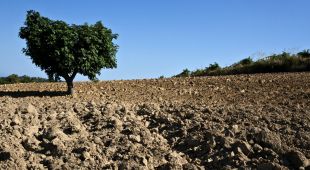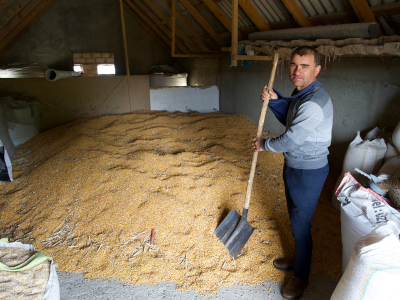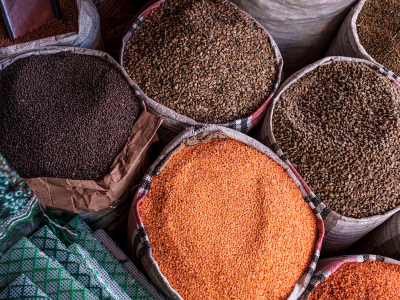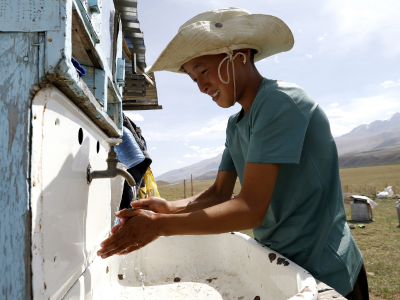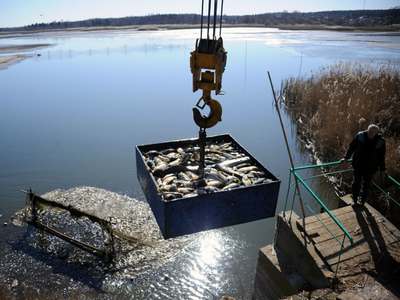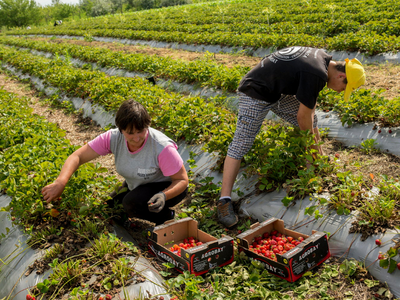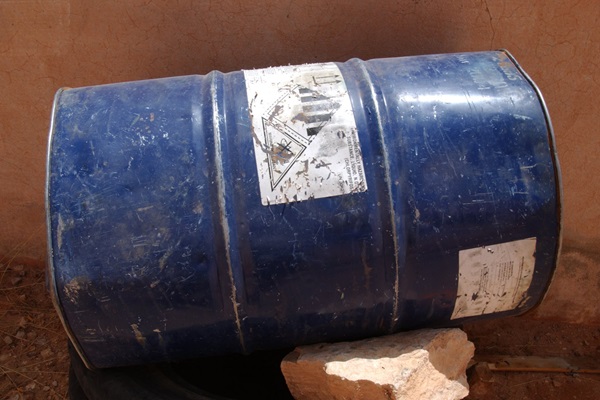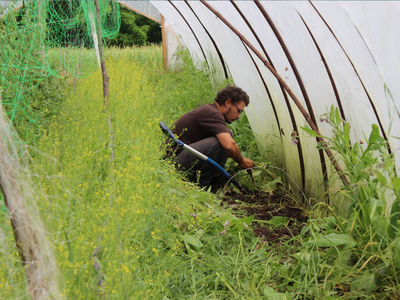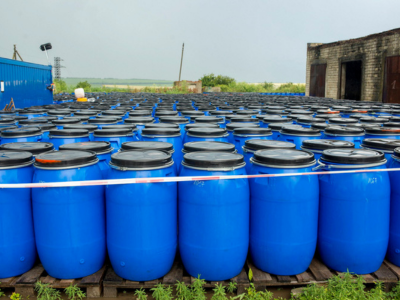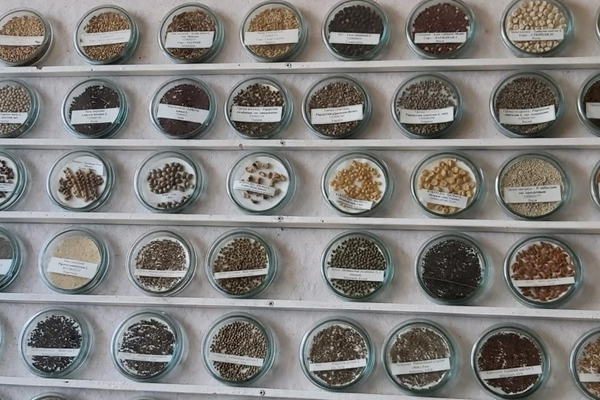This Regional Priority Programme supports Member Nations in strengthening national capacities and enhancing processes for sustainable natural resources management; adapting and mitigating climate change and reducing disaster risks in agriculture, forestry and fisheries; preserving biodiversity through natural capital investment, innovation and public–private partnerships; and reducing the environmental impacts of agrifood systems – including pollution and chemical and plastic wastes – through bioeconomy and socially inclusive and equitable approaches.
The Regional Priority Programme promotes achievement of the Paris Agreement, the Sendai Framework for Disaster Risk Reduction 2015–2030, the Convention on Biological Diversity and the Sustainable Development Goals, especially goals 1, 2, 6, 12, 13 and 15. It also contributes to the FAO Strategic Framework 2022–31 and its four betters.
The Regional Priority Programme offers a regional mechanism to assist countries in accessing climate finance, such as the Green Climate Fund (GCF) and the Global Environmental Facility (GEF), including tools and thematic support to formulate interventions at the nexus of climate change, food security, gender and rural poverty.
The Priority Programme works through three main components:
The Priority Programme leverages four FAO accelerators:
- Technology: The Regional Priority Programme promotes the most appropriate climate technologies, green technology and local knowledge to enhance evidence-based decision-making and help increase the efficiency and climate-resilience of agrifood systems.
- Innovation: The Regional Priority Programme supports countries in envisaging a new paradigm on agriculture, fisheries and forestry, helping them promote production while supporting environmental sustainability. Innovation is key to achieving this goal. This Priority Programme aims to make available science-based evidence and frameworks in collaboration with academic institutions.
- Data: To support the uptake of innovative, climate-smart technologies and policies, it is important that disaggregated data related to climate and environmental impacts be available at the national level. Data collection and dissemination are important for the deliverance of the Priority Programme’s goals across varied subjects, linking to the Hand-in-Hand Priority Programme’s geospatial platform.
- Complements: The Regional Priority Programme contributes to strengthening national and institutional capacities to develop and assess trade-offs and implement and sustain evidence-based policies and strategies for climate action, natural resources management, biodiversity and bioeconomy.
Featured news
Embedding cross-cutting themes:
- Inclusion of Indigenous Peoples, women, youth, and poor and vulnerable communities
- Regional Technical Platform on Green Agriculture
This Regional Priority Programme also contributes to the promotion of Globally Important Agricultural Heritage Systems (GIAHS), supporting the acknowledgment of traditional, highly valuable agricultural systems in the region that are examples of heritage to be preserved. The GIAHS programme recognizes these systems as outstanding landscapes of aesthetic beauty that combine agricultural biodiversity, resilient ecosystems, and valuable cultural heritage. Located in specific sites around the world, these systems sustainably provide multiple goods and services, food, and livelihood security for millions of small-scale farmers.

Events
27/ 6
2023
GEF-funded project “Integrated Natural Resources Management in Degraded Landscapes in the Forest-Steppe Zone of Ukraine” closes
Kyiv (Ukraine), Hybrid Event, 27/06/2023
Invited speakers will present the main achievements of the project, review its challenges, and describe further plans and opportunities. The project was a joint initiative of the Food and Agriculture Organization of the United Nations (FAO) and Global Environment Facility (GEF), the Ministry of Environmental Protection and Natural Resources of Ukraine, and the Ministry of Agrarian Policy a...
21/ 6
2023
22/6
2023
Second regional dialogue on biodiversity mainstreaming across agricultural sectors in Europe and Central Asia
Virtual Event, 21/06/2023 - 22/06/2023
The interlinked climate change and biodiversity-related crises top the charts of short-term and long-term risks the world will face over the next decade. The restoration, conservation and sustainable use of biological diversity are critical to addressing global environmental challenges, building our ...
11/ 4
2023
Inception Workshop on Carbon Sequestration through Climate Investment in Forests and Rangelands
Bishkek (Kyrgyzstan), Hybrid Event, 11/04/2023
On Tuesday 11 April FAO is organizing the launch of the FAO-GCF project “Carbon Sequestration through climate investment in forests and rangelands (CS-FOR) in the Kyrgyz Republic”.
24/ 5
2023
Nature-based solutions related to apiculture and wild pollinators
Qakh (Azerbaijan), Hybrid Event, 24/05/2023
The FAO Subregional Office for Central Asia is organizing a hybrid event “Nature-based solutions related to apiculture and wild pollinators” on 24 May 2023.
27/ 3
2023
Localizing SDGs: Agrifood systems transformation as a key accelerator
Virtual Event, 27/03/2023
2030 is seven years away and we are far from achieving the SDGs. We are at risk of not achieving in full the targets related to agrifood systems by 2030. Climate change, along with other drivers and crises, is already undermining the recent progress made in promoting sustainable rural livelihoods and fighting against all forms of malnutrition. To continue ensuring food security and nutrition...
13/ 3
2023
17/3
2023
Regional Training on Strengthening seed system management in South European and Central Asian countries
Yerevan (Armenia), 13/03/2023 - 17/03/2023
In the framework of the regional programme on seed system and the project titled “Creating enabling environments for enhanced climate resilience in agriculture”, FAO Regional Office for Europe and Central Asia is organizing a regional training between 13-17 March 2023 Yerevan, Armenia, to strengthen seed system management in South European and Central Asia c...
14/ 12
2022
Green Agriculture and Science and Innovation: Main scientific findings in Europe and Central Asia
Virtual Event, 14/12/2022
Agrifood systems in Europe and Central Asia are deeply affected by geopolitical and economic uncertainties which impact both directly and indirectly on food supply chains, and have repercussions in food markets; moreover, they are threatened by environmental, human-driven long-term stresses, such as climate change, deforestation, biodiversity loss and natural resource degradation.
5/ 12
2022
6/12
2022
Regional Webinar Series on Soil Protection as part of World Soil Day 2022
Hybrid Event, 05/12/2022 - 06/12/2022
Let’s celebrate World Soil Day 2022! As soils provide most of our food and are central to our planet’s life-support system. Without healthy soils, we cannot sustain healthy lives.
30/ 9
2021
Regional workshop for Globally Important Agricultural Heritage Systems in Azerbaijan
Hybrid Event, 30/09/2021
In the frame of the European Union-funded project on the development of sustainable and inclusive local agrifood systems in north-west region of Azerbaijan, the Republic of Azerbaijan embarked on identifying potential agricultural heritage systems in its north-west region.
16/ 11
2021
17/11
2021
Regional dialogue on biodiversity mainstreaming across agricultural sectors in Europe and Central Asia
Hybrid Event, 16/11/2021 - 17/11/2021
11:00 – 13:00 (CET) FAO supports member countries in mainstreaming biodiversity conservation and sustainable use in the agriculture sector. Following the first global multi-stakeholder dialogue, and in line with its mandate to coordinate a collective effort, FAO convenes the first regional dialogue on biodiversity mainstreaming for Europe and Central Asia.
22/ 2
2022
FAO’s 2nd Regional Workshop: The Road Ahead after COP26: Enhancing Targets and Compliance with Enhanced Transparency Framework (ETF) for Agriculture and LULUCF
Hybrid Event, 22/02/2022
10.00-13.00 (CET) The FAO Regional Workshop, “The Road Ahead after COP26: Enhancing Targets and Compliance with Enhanced Transparency Framework (ETF) for Agriculture and LULUCF” aims to support the developing states and emerging economies of the Europe a...
See also:
Policy analysis of nationally determined contributions in Europe and Central Asia
Strategy for FAO’s work on climate change
Scaling up Agroecology Initiative
Building a common vision for sustainable food and agriculture
Strategic work of FAO for sustainable food and agriculture
Publication: Nature-based solutions
Contact
Tania Santivanez
Agricultural officer
20 Kalman Imre utca
H-1054 Budapest
Hungary
Tel: +36 1 8141 240



